
In today's healthcare landscape, the importance of cybersecurity cannot be overstated. Data security as a service (DSaaS) emerges as a vital solution for healthcare CFOs, offering a range of benefits that include:
By outsourcing cybersecurity needs, CFOs can significantly reduce IT expenditures while ensuring robust protection against escalating cyber threats and regulatory challenges. This strategic alignment of financial objectives with essential security measures is not merely beneficial; it is imperative for safeguarding sensitive information and maintaining operational integrity.
With the increasing complexity of cyber threats, healthcare organizations must prioritize cybersecurity to protect their assets and reputation. DSaaS provides a pathway to achieving this, enabling CFOs to focus on their core responsibilities while leaving the intricacies of cybersecurity to specialized experts. The decision to embrace DSaaS is not just a financial one; it is a commitment to ensuring a secure and compliant healthcare environment.
The healthcare sector is facing an escalating threat from cyber attacks, with medical data breaches occurring at an alarming rate. In this challenging landscape, CFOs must navigate the complexities of financial management while safeguarding sensitive patient information. The adoption of Data Security as a Service (DSaaS) emerges as a crucial strategy, providing a robust solution to these pressing challenges. This article delves into ten compelling benefits that DSaaS offers to healthcare CFOs, ranging from significant cost savings to enhanced compliance and operational efficiency. However, with the stakes so high, how can healthcare organizations ensure they are making the right investments in cybersecurity to protect sensitive patient information while maintaining financial health?
In today's healthcare landscape, the importance of robust cybersecurity cannot be overstated. Cyber Solutions Inc. provides data security as a service specifically designed for medical organizations, addressing the industry's unique challenges such as regulatory compliance and information protection. Recent trends reveal a notable increase in cyber threats, with medical data breaches averaging 1.99 incidents per day in 2023. This alarming statistic underscores the pressing need for that not only safeguard sensitive information but also align with the financial objectives of CFOs in the medical sector, ensuring that investments in cybersecurity yield measurable returns.
The advantages of data security as a service for medical institutions are numerous. It offers continuous monitoring and threat detection, which is crucial given that 70% of successful breaches begin on endpoint devices. Furthermore, DSaaS provides compliance as a service (CaaS), assisting entities in navigating intricate regulatory frameworks such as HIPAA and GDPR, essential for protecting sensitive patient information.
Cybersecurity specialists emphasize the significance of customized solutions for financial officers in the medical sector. As one expert noted, "A tailored approach to data protection not only reduces risks but also supports the financial well-being of medical institutions by preventing costly breaches."
Cyber Solutions Inc. tailors its DSaaS offerings by conducting thorough assessments of each client's specific needs, ensuring that the solutions implemented are both effective and aligned with their operational goals. Successful implementations have demonstrated considerable enhancements in safety posture and compliance adherence, establishing Cyber Solutions as a trusted partner for CFOs in the medical sector as they navigate the complexities of contemporary cybersecurity challenges.
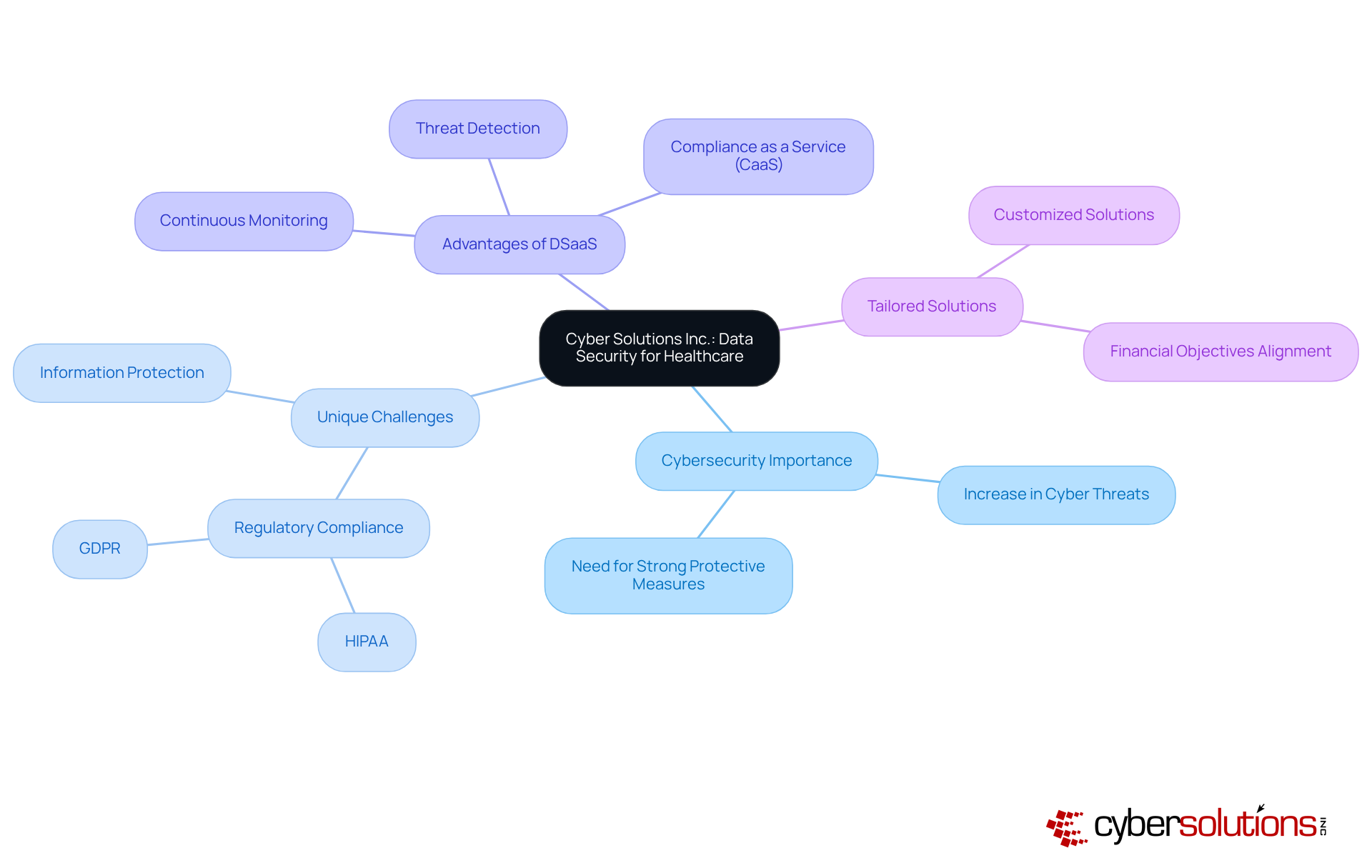
In today's healthcare landscape, implementing data security as a service is not just beneficial—it's essential. With the , healthcare providers face unique challenges that demand immediate attention. By outsourcing security needs, CFOs can significantly reduce IT costs, eliminating expenses tied to maintaining in-house security teams and infrastructure, which often encompass salaries, training, and technology investments. This model offers predictable monthly expenses through a flat-rate pricing structure that covers all services, including email licenses and advanced cybersecurity solutions, enhancing both financial planning and resource allocation. Entities adopting this approach can witness an average decrease in IT costs of up to 30%, transitioning from capital-heavy investments to more flexible operational expenses.
The financial advantages extend well beyond immediate cost reductions. The potential decrease in costs associated with breaches—averaging $4.35 million per incident—along with penalties for non-compliance with regulations like HIPAA, can substantially improve overall savings. In 2023, medical entities reported 725 data breaches, underscoring the critical need for robust cybersecurity measures. By outsourcing these services, CFOs not only mitigate the risk of costly breaches but also ensure compliance with evolving regulatory standards, thereby further protecting their financial health. Expert insights reveal that entities leveraging data security as a service can achieve a stronger security posture while maximizing their IT budgets, particularly through efficient incident response strategies that incorporate swift on-site assistance and layered recovery methods. This positions outsourcing as a strategic option for financial executives in the medical field.
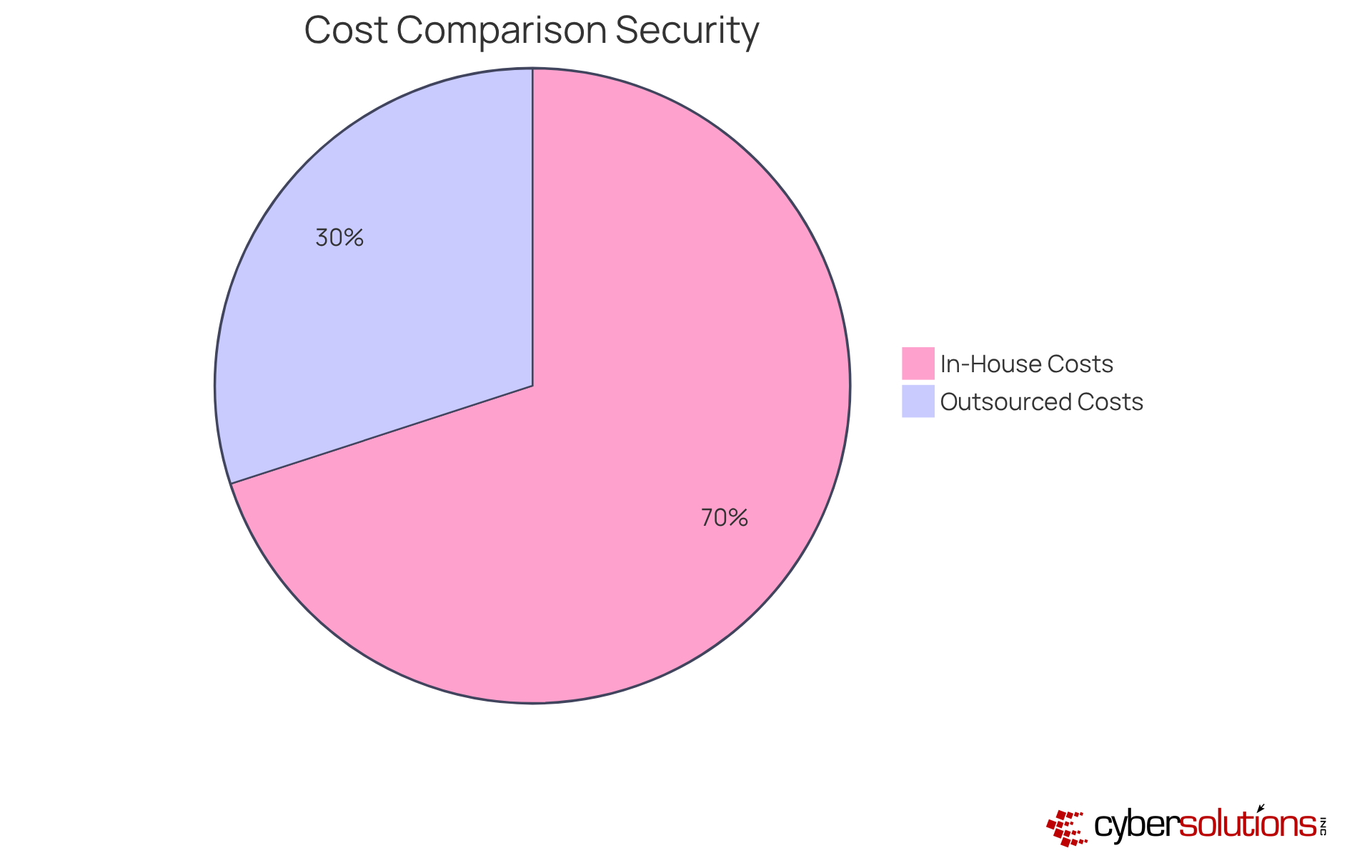
In today's digital landscape, cybersecurity is not just an option for medical institutions; it is a necessity. With 92% of healthcare organizations experiencing at least one cyberattack in the past year, the urgency for has never been more pronounced. Data security as a service empowers these institutions by granting access to a dedicated team of cybersecurity specialists focused on safeguarding sensitive information. This expertise is crucial for identifying vulnerabilities and implementing strong security measures tailored to the unique challenges of the medical field.
The implications of these threats are significant. CFOs must navigate stringent regulations like HIPAA while effectively mitigating emerging risks. By leveraging the expertise of seasoned professionals, they can ensure compliance and protect their organizations. Our comprehensive HIPAA compliance solutions integrate strong cybersecurity measures, including proactive risk management and professional guidance through virtual CISO services. This approach not only prepares medical organizations for audits but also fortifies them against potential breaches.
As highlighted by cybersecurity experts, enhancing information security requires a proactive strategy. Possessing a specialized team can significantly reduce the risk of breaches, which have surged by 93% since 2018. Implementing application allowlisting serves as a critical layer of defense, preventing unauthorized software from executing and ensuring adherence to regulatory standards. The impact of specialized cybersecurity teams on the protection of medical information is profound, offering the essential skills and insights needed to navigate the complex landscape of digital threats, ultimately preserving patient trust and organizational integrity.
To maximize these benefits, CFOs should consider engaging cybersecurity services for regular audits and assessments. This proactive approach ensures that defenses remain robust and up-to-date, safeguarding the future of their organizations.
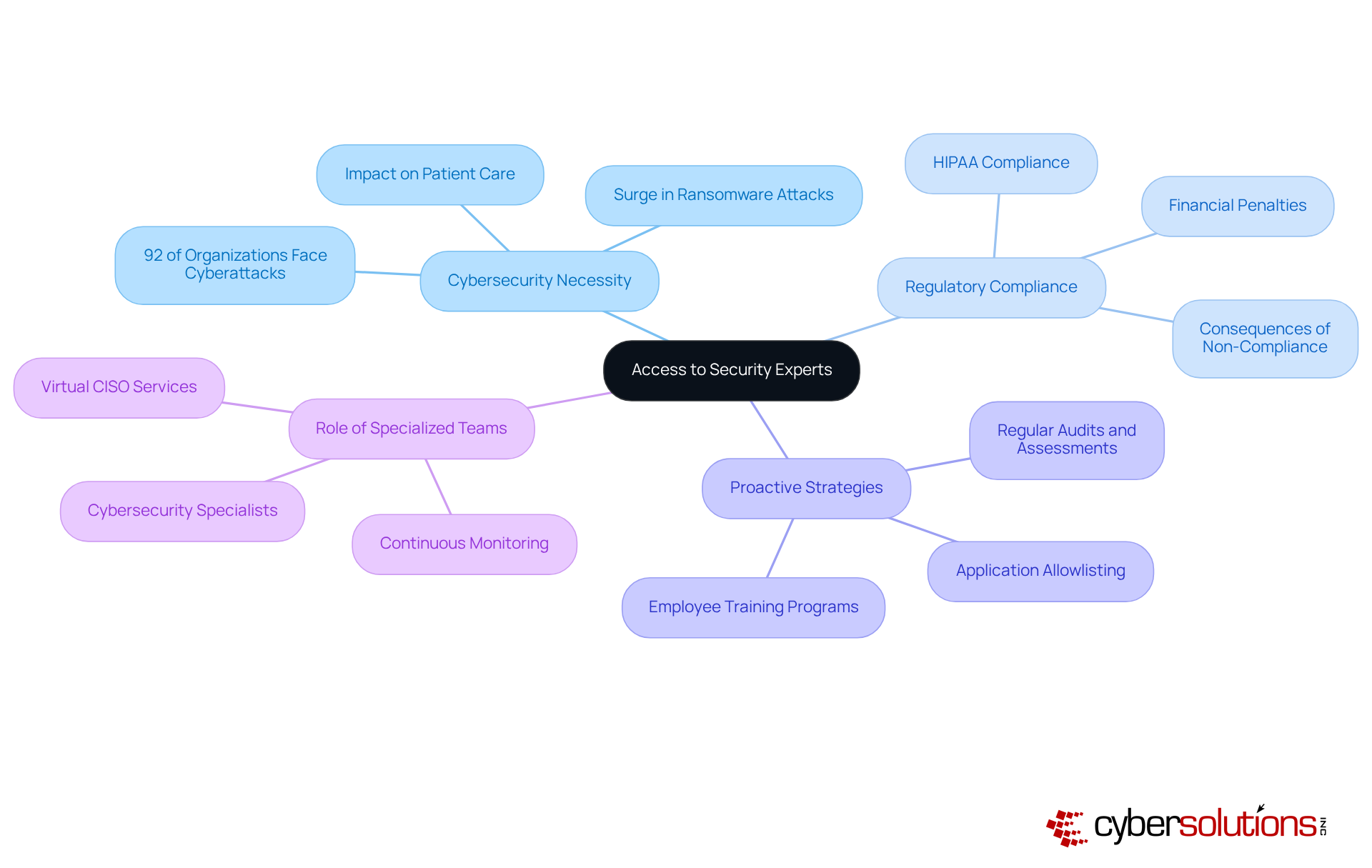
In today's healthcare landscape, data security as a service is paramount, encompassing continuous monitoring of healthcare data systems to facilitate proactive threat detection. This real-time surveillance is essential for identifying and addressing potential security incidents before they escalate into significant breaches. For CFOs, the implications are substantial: it not only mitigates the risk of financial loss and reputational damage but also ensures compliance with stringent regulatory requirements such as HIPAA.
Our HIPAA compliance services integrate robust cybersecurity measures, including:
Additionally, we provide extensive reporting and audit assistance, ensuring your entity is always prepared for compliance checks. This includes thorough documentation of risk assessments and remediation plans tailored to HIPAA standards.
Moreover, AI-powered threat detection tools are revolutionizing the cybersecurity landscape by continuously analyzing data to identify unusual activities, thereby enhancing the confidentiality, integrity, and availability of PHI. These tools have demonstrated the ability to reduce incident response times by up to 70%, enabling healthcare organizations to respond swiftly to potential threats.
The advantages of proactive threat identification extend beyond compliance; they foster a culture of awareness among staff, thereby decreasing vulnerabilities related to insider threats. Regular safety training underscores the significance of data protection methods, equipping employees to recognize and report suspicious behavior. As medical facilities increasingly adopt remote patient monitoring solutions—projected to reach 71 million users by 2025—the necessity for comprehensive protective measures becomes even more critical.
Furthermore, our expert guidance and virtual CISO services provide strategic leadership to manage your compliance efforts and protection strategies, ensuring your systems remain safe, compliant, and audit-ready at all times. Ultimately, the incorporation of through data security as a service not only safeguards patient information but also enhances operational efficiency, allowing healthcare entities to thrive in a dynamic regulatory environment.

In today's digital landscape, the importance of cybersecurity in healthcare cannot be overstated. One of the significant advantages of data security as a service is its scalability. Healthcare institutions can easily modify their protective services according to present requirements, whether they are expanding operations or encountering new regulatory challenges. This flexibility is crucial for CFOs, allowing them to while ensuring that their security measures remain robust and relevant.
As the healthcare sector continues to face evolving cybersecurity threats, the ability to adapt security services becomes paramount. By leveraging scalable solutions, organizations can not only safeguard sensitive data but also utilize data security as a service to align their security strategies with operational needs, thereby fostering confidence among stakeholders and enhancing overall organizational resilience.
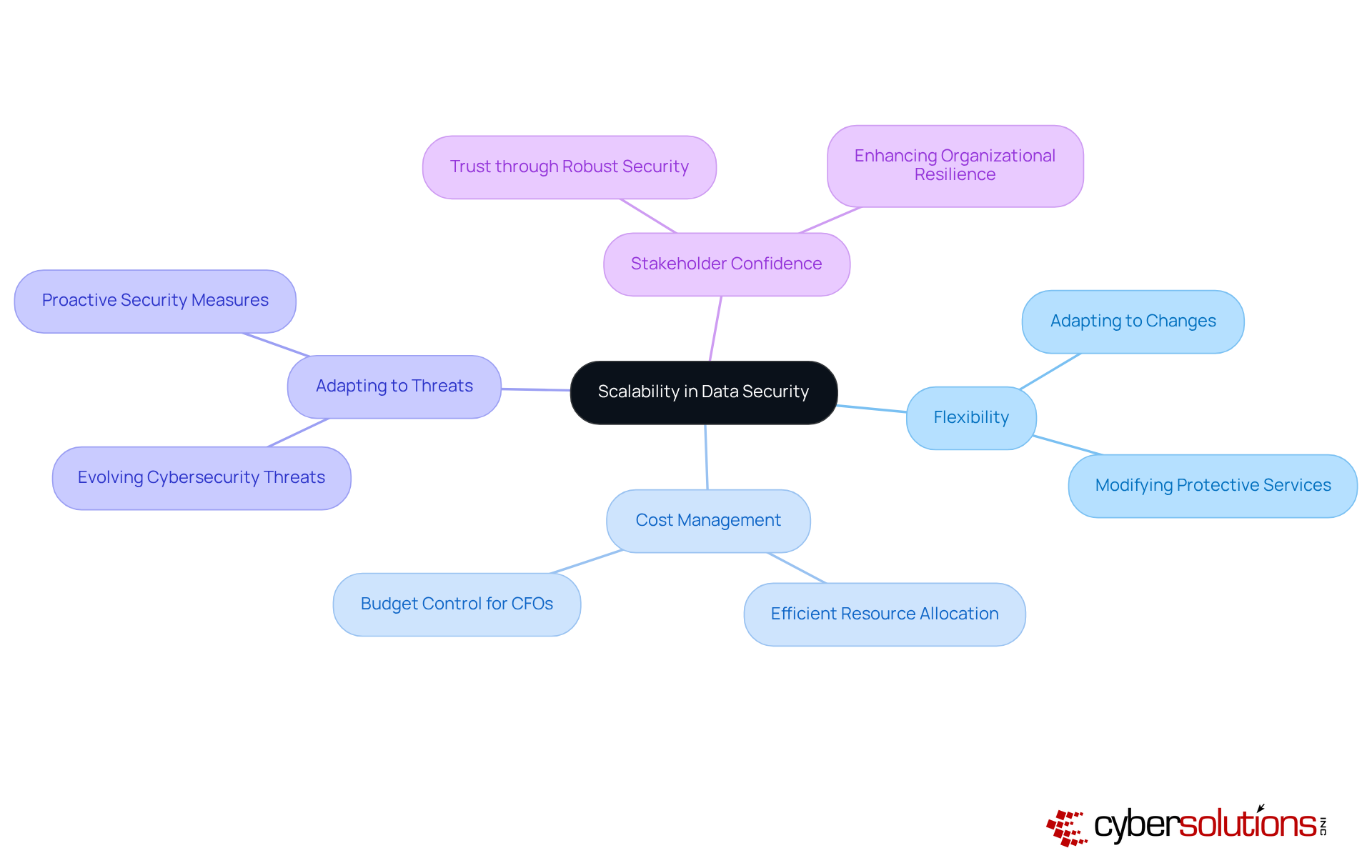
Data security as a service empowers medical organizations to navigate compliance confidently with critical regulations such as HIPAA and GDPR. By implementing data security as a service, CFOs can ensure their information protection strategies are robust and aligned with legal mandates, significantly mitigating the risk of costly fines and legal challenges. The medical sector has faced an astonishing 3,912 breach incidents from 2005 to 2019, with hacking incidents accounting for 64.65% of exposed records, underscoring the urgent need for effective compliance measures.
Furthermore, maintaining compliance is crucial for fostering trust among patients and stakeholders. Legal specialists emphasize that adherence to HIPAA and GDPR not only protects sensitive patient data but also enhances the overall reputation of medical institutions. For instance, the average cost of a medical information breach has escalated to $6.45 million, highlighting the financial repercussions of non-compliance. By leveraging data security as a service, organizations can implement comprehensive security protocols, including:
that meet regulatory requirements, thereby safeguarding their operations and reinforcing patient trust in their commitment to information protection.
In addition to these measures, DSaaS provides essential Reporting and Audit Support, ensuring that medical entities remain audit-ready with thorough documentation and compliance reports tailored to HIPAA standards. Expert Guidance through fractional or virtual CISO services further bolsters compliance efforts, delivering strategic leadership and oversight without the financial burden of a full-time hire.
In a landscape where the medical sector is increasingly targeted by cyber threats, data security as a service emerges as a strategic solution for ensuring compliance and mitigating risks associated with breaches. This proactive approach not only satisfies regulatory demands but also empowers medical institutions to thrive in an environment where information security is paramount. With features such as continuous monitoring and expert guidance, data security as a service ensures that medical entities remain audit-ready and compliant, ultimately (PHI) from unauthorized access and cyberattacks.
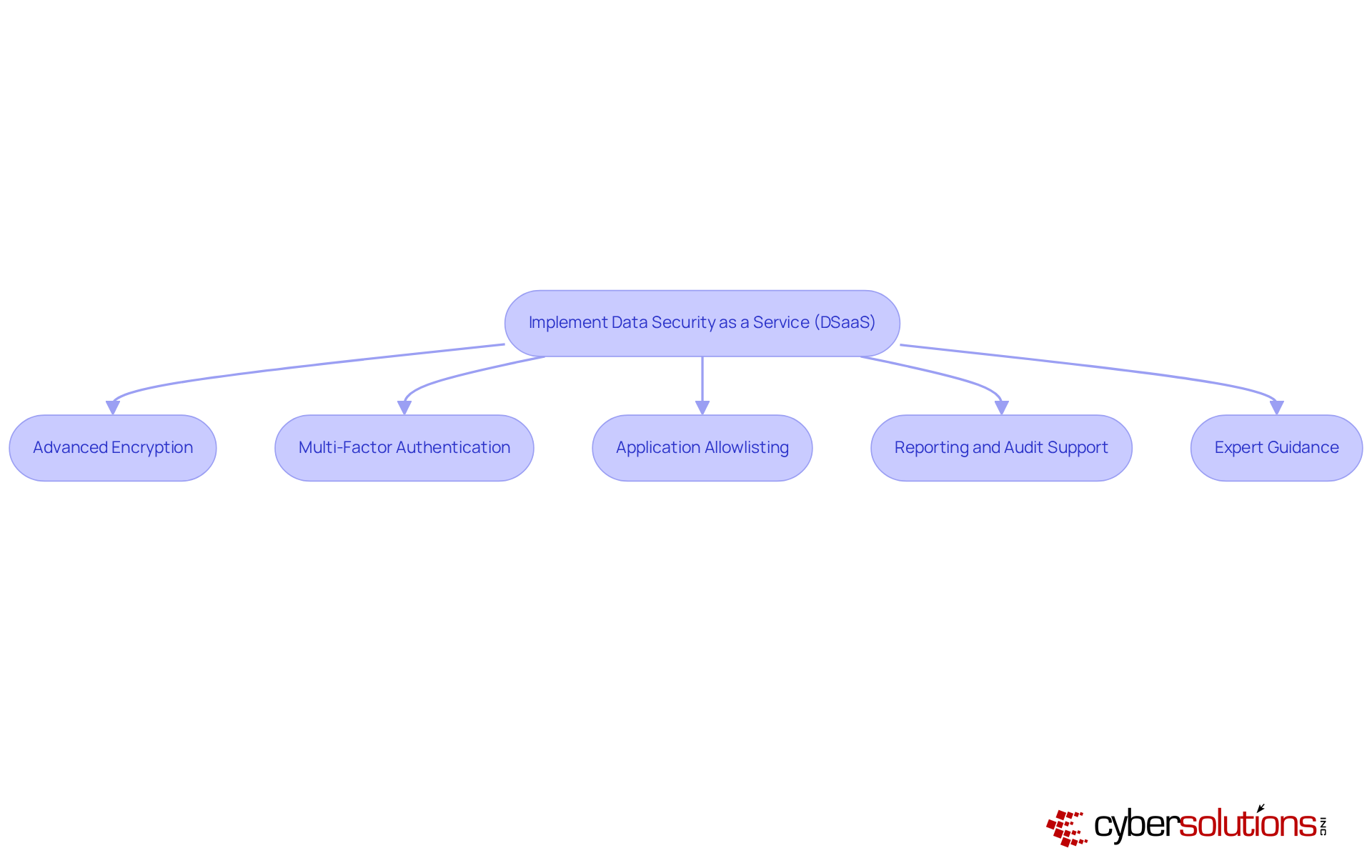
Information Security as a Service (DSaaS) harnesses advanced technologies, particularly artificial intelligence (AI) and machine learning (ML), to significantly bolster protection within the healthcare sector. These technologies facilitate the rapid identification and response to threats, empowering organizations to safeguard sensitive patient information more effectively. For CFOs, investing in DSaaS not only enhances safety but also underscores a commitment to protecting patient information, which is vital in today’s regulatory landscape.
AI and ML are instrumental in automating threat detection and response processes, enabling healthcare entities to proactively identify vulnerabilities and mitigate risks. For example, AI-driven analytics can analyze extensive data sets to detect anomalies that may signal a security breach, while machine learning algorithms continuously evolve to counteract emerging threats, ensuring defenses remain resilient against new attack vectors.
Moreover, comprehensive HIPAA compliance solutions, paired with robust cybersecurity measures, are essential for healthcare organizations. These solutions encompass proactive risk management, advanced encryption, multi-factor authentication (MFA), and continuous monitoring to shield patient health information (PHI) from unauthorized access and breaches. Additionally, our services provide reporting and audit support, ensuring organizations are well-prepared for compliance evaluations. The implementation of 24/7 threat monitoring guarantees that suspicious activities are identified and neutralized before escalating into significant threats, protecting against ransomware, phishing, and other malware attacks.
Applications of AI and ML in DSaaS include predictive analytics that foresee potential threats based on historical data and automated incident response systems capable of neutralizing dangers in real-time. These innovations not only strengthen the security posture of healthcare entities but also enhance operational efficiency, enabling staff to focus on core responsibilities rather than being encumbered by security concerns.
As the healthcare sector faces increasing cyber threats, with 97% of organizations reporting a rise in threats since the beginning of the Russia-Ukraine war, the integration of AI and ML into DSaaS represents a strategic investment for CFOs, aligning financial stewardship with the imperative of data protection. This commitment not only but also fosters trust among patients and stakeholders, enhancing the organization’s reputation in a competitive environment. Furthermore, our expert guidance and fractional or virtual CISO services offer leadership to oversee compliance efforts and security strategies. As noted in the CrowdStrike 2025 Threat Hunting Report, adversaries are weaponizing AI at scale, making it imperative for healthcare entities to adopt these technologies. Additionally, with cybercrime costs anticipated to reach $10.5 trillion annually by 2025, the financial ramifications of inadequate cybersecurity measures are significant. A statement from the Department of Health and Human Services underscores the necessity of implementing high-impact cybersecurity practices, further reinforcing the importance of investing in data security as a service solutions that leverage AI and ML.
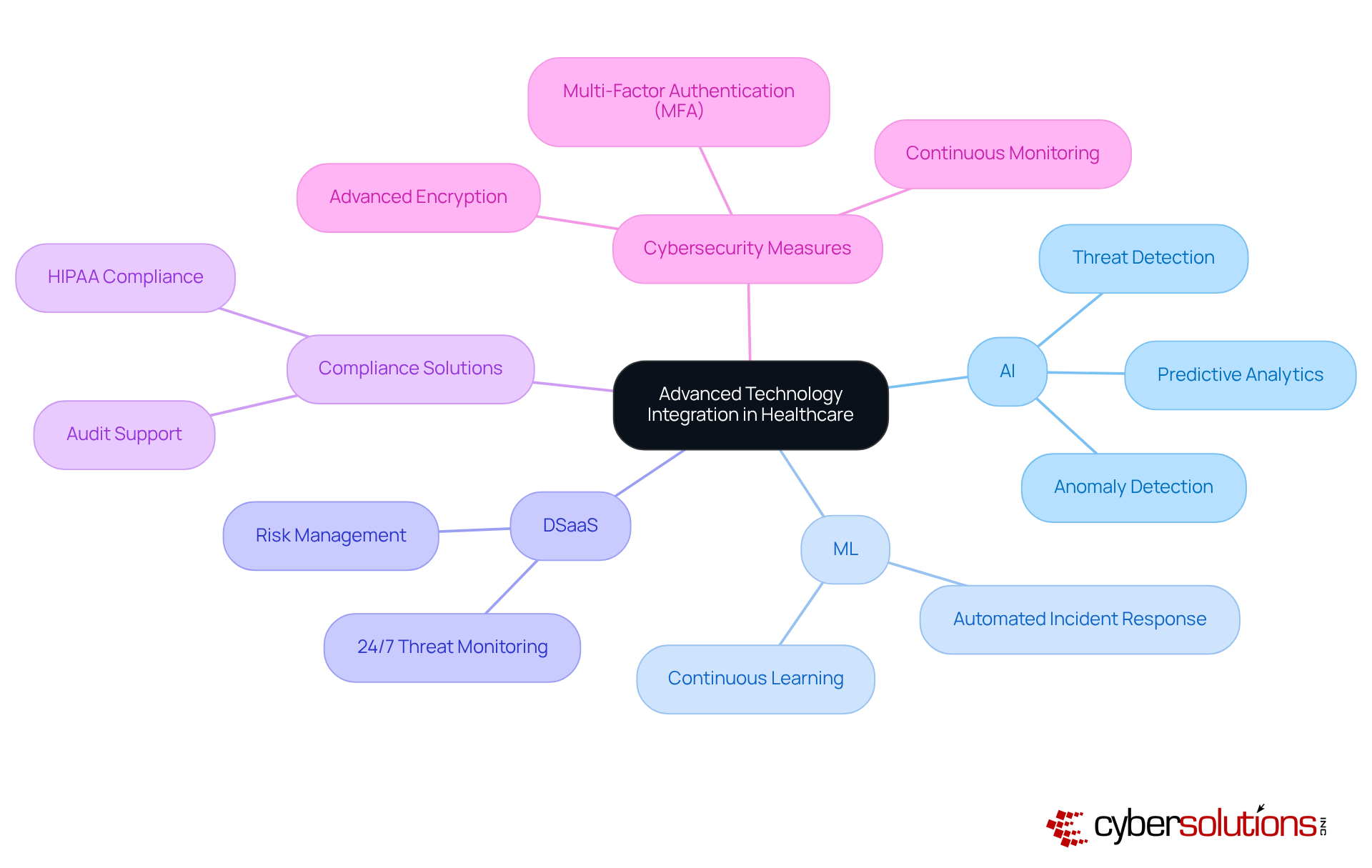
In today's landscape, the importance of cybersecurity in healthcare cannot be overstated. Medical institutions face unique challenges, particularly in the event of a security breach, making a robust incident response strategy essential.
Data Security as a Service from Cyber Solutions offers rapid recovery solutions that significantly reduce downtime and financial losses. For CFOs, this means a swift return to normal operations, effectively mitigating the adverse effects of a breach on both finances and reputation.
The Ponemon Institute reports that healthcare organizations experience an average downtime of 24 days following a ransomware attack, underscoring the urgent need for effective incident response. As Jade Davis, Chair of the subcommittee, stated, 'Incident Response Plans aid in guaranteeing that Members are well-prepared to react swiftly and efficiently to cybersecurity incidents and potential information breaches.'
This scenario highlights the critical necessity for . Implementing comprehensive recovery strategies, including a structured response plan and a layered approach, not only protects patient data but also enhances organizational resilience against future incidents.
Organizations that embrace proactive monitoring and rapid recovery protocols can anticipate a significant improvement in operational continuity and overall security posture. By demonstrating a reliable and effective response, Cyber Solutions fosters strong, ongoing partnerships with medical providers, aiding them in maintaining a high standard of cybersecurity.
This approach not only protects sensitive information but also builds trust among patients and stakeholders, ultimately bolstering the financial health of the organization.
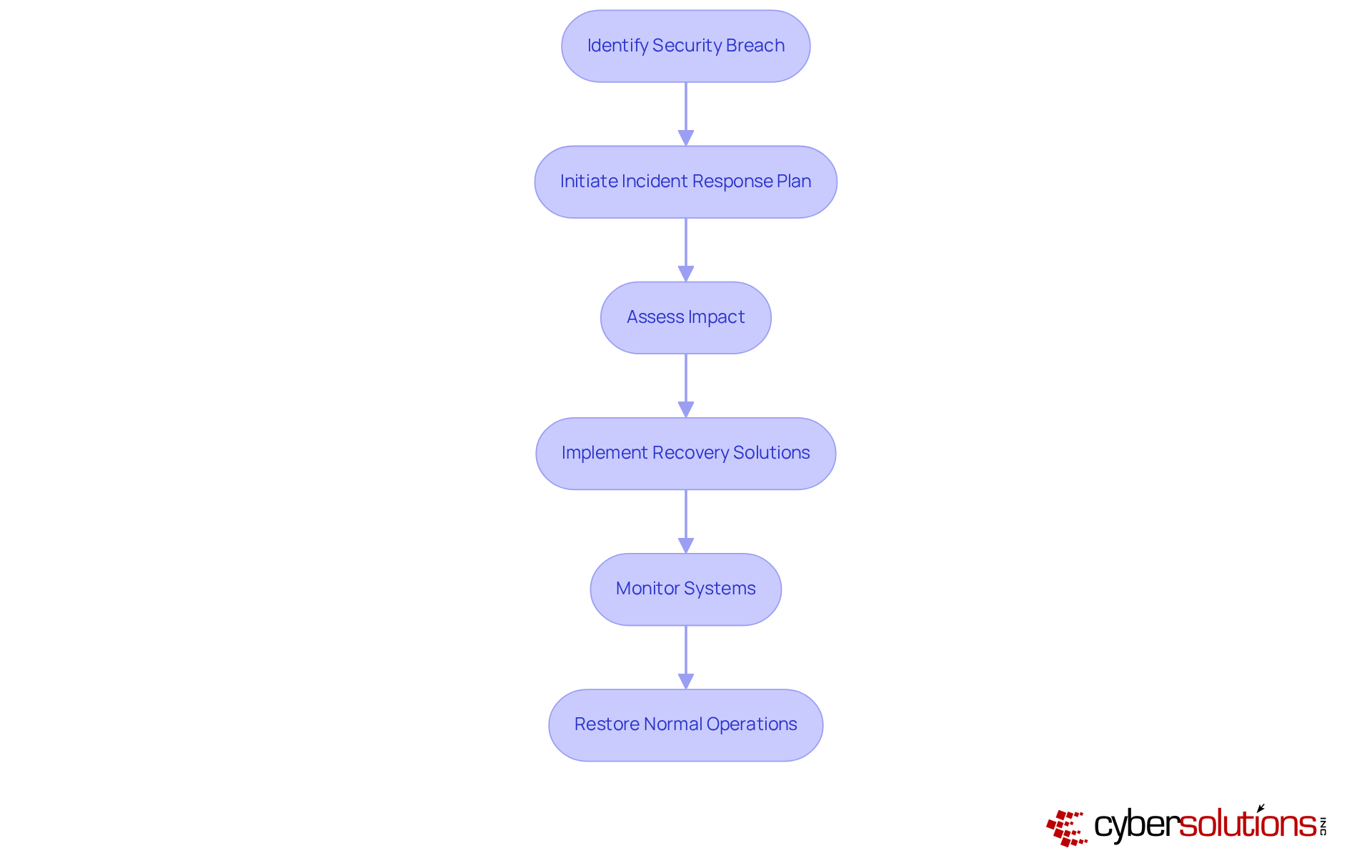
Data security as a service is paramount in fostering a security-conscious culture within medical organizations through extensive employee training programs. By equipping staff with knowledge about potential threats and best practices for data protection, CFOs can significantly mitigate the risk of human error, which constitutes approximately 74% of data breaches in the healthcare sector. This not only fortifies security measures but also cultivates a culture of accountability and vigilance among employees.
Industry leaders underscore the necessity of such training. Manu Singh, VP of Risk Engineering at Cowbell, asserts that companies must adopt a proactive approach to safeguard their information assets. Furthermore, cultivating a security-first mindset is essential; as Michael Mestrovich points out, straightforward behavioral adjustments can markedly enhance a company's defense against cyber threats.
Moreover, tailored IT solutions—such as application allowlisting, endpoint protection, and threat detection—play a crucial role in this strategy. By ensuring that only approved applications can operate, organizations can prevent unauthorized software from executing, thereby reducing vulnerabilities and enhancing adherence to regulations like HIPAA. Statistics reveal that human mistakes are a primary factor in security incidents, making it imperative for medical facilities to prioritize training programs. By doing so, they not only protect sensitive patient data but also foster an environment where employees are vigilant and informed, ultimately diminishing the likelihood of costly breaches.
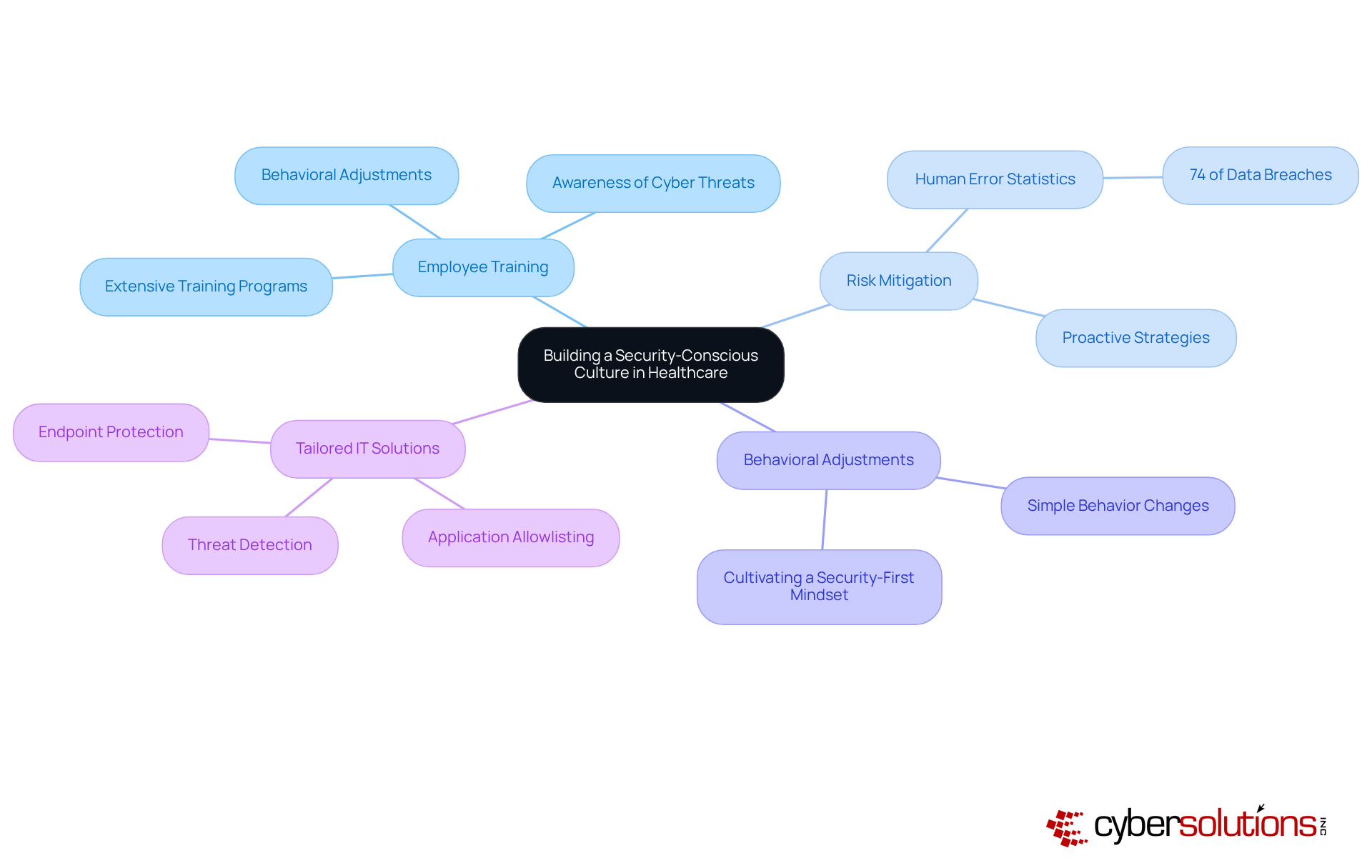
Implementing data security as a service is paramount in enhancing operational efficiency within healthcare entities. By streamlining security processes, DSaaS alleviates the burden on internal IT teams, enabling CFOs to focus on strategic initiatives that drive growth and innovation. This transition not only strengthens financial performance but also fosters a more agile and responsive organization. Notably, healthcare CFOs report that adopting data security as a service can reduce IT-related workloads by up to 30%, allowing teams to redirect their efforts toward patient care and operational enhancements.
Moreover, integrating advanced cybersecurity solutions within DSaaS frameworks simplifies protective measures, ensuring compliance with regulatory standards while safeguarding sensitive patient information. As Colleen Aubrey, SVP of AWS Solutions, remarks, "With Amazon One, we've created a palm recognition system that respects privacy while making check-ins simpler when patients have more important things on their minds." This perspective underscores the growing trend of , all while upholding stringent security standards.
In conclusion, the adoption of data security as a service not only mitigates risks associated with cyber threats but also empowers healthcare organizations to operate more efficiently, ultimately leading to improved patient outcomes and satisfaction.
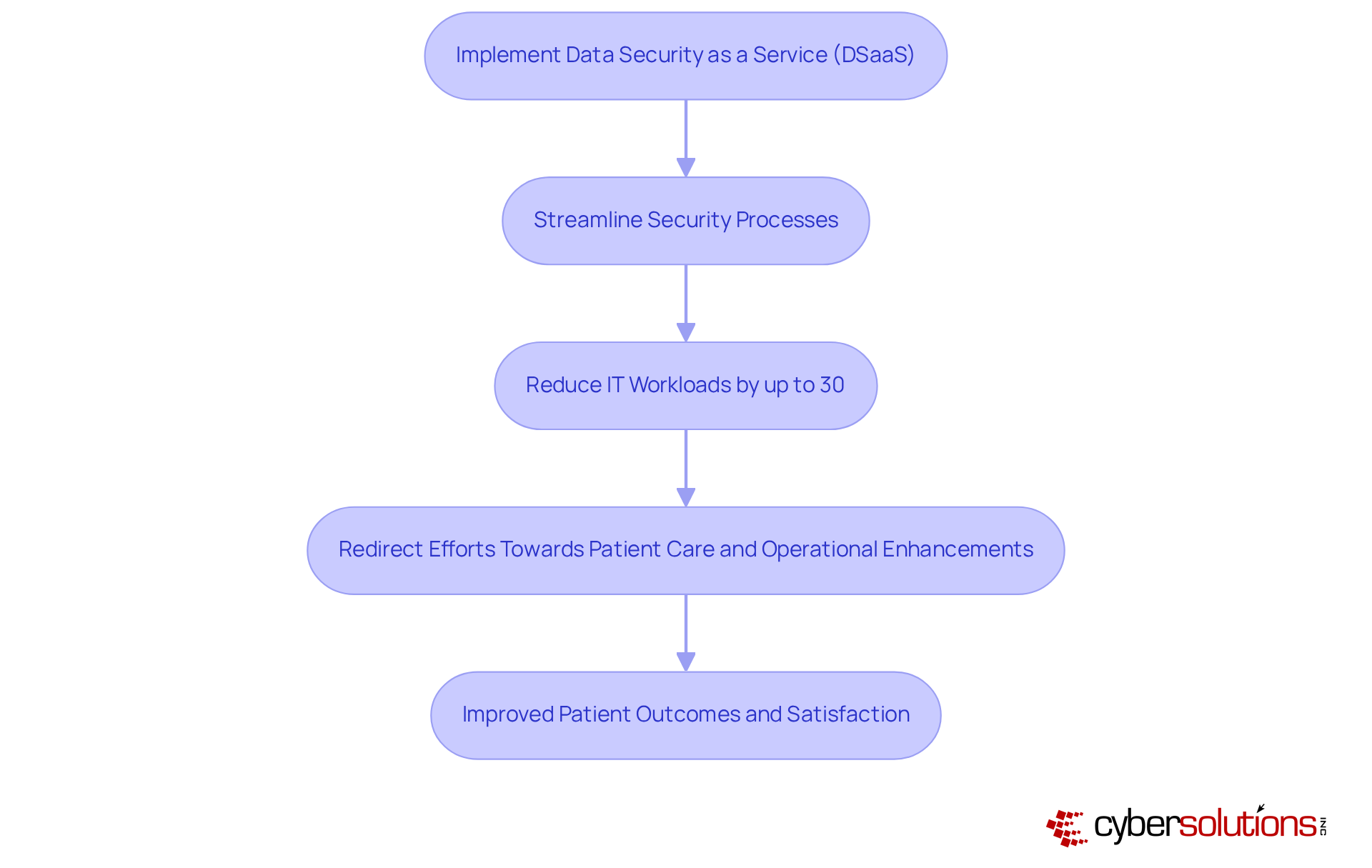
The implementation of Data Security as a Service (DSaaS) is a game-changer for healthcare organizations, especially for CFOs who must align cybersecurity with financial goals. In an era where cyber threats are escalating, outsourcing security needs not only fortifies protective measures but also drives significant cost savings and operational efficiency. This strategic pivot empowers healthcare providers to concentrate on their primary mission—patient care—while safeguarding sensitive data and ensuring compliance with regulatory standards.
This article has delved into the myriad benefits of DSaaS, such as:
Each of these elements highlights the essential role that customized data security solutions play in protecting patient information and bolstering the financial health of healthcare organizations. By harnessing advanced technologies and proactive incident response strategies, medical entities can substantially mitigate their vulnerability to breaches and cultivate a culture of security awareness among employees.
Ultimately, investing in data security as a service transcends mere defense; it embodies a proactive strategy that enables healthcare organizations to flourish in an increasingly intricate digital landscape. As cyber threats continue to evolve, the capacity to adapt security measures, ensure compliance, and enhance operational efficiency becomes crucial. Healthcare CFOs must prioritize robust data security solutions, as this not only safeguards patient trust but also strengthens the organization’s reputation and financial sustainability in a competitive environment.
What is Cyber Solutions Inc. and what services do they provide?
Cyber Solutions Inc. offers data security as a service specifically tailored for medical organizations, focusing on addressing unique challenges such as regulatory compliance and information protection.
Why is cybersecurity important in the healthcare sector?
Cybersecurity is crucial in healthcare due to the increasing number of cyber threats, with medical data breaches averaging 1.99 incidents per day in 2023. Strong protective measures are necessary to safeguard sensitive information and align with the financial objectives of healthcare CFOs.
What are the benefits of data security as a service (DSaaS) for medical institutions?
DSaaS provides continuous monitoring and threat detection, compliance as a service (CaaS) for navigating regulatory frameworks like HIPAA and GDPR, and tailored solutions that enhance safety posture and compliance adherence.
How does outsourcing security needs affect IT costs for healthcare providers?
Outsourcing security needs allows CFOs to reduce IT costs by eliminating expenses related to in-house security teams and infrastructure. This model offers predictable monthly expenses and can lead to an average decrease in IT costs of up to 30%.
What are the potential financial advantages of implementing data security as a service?
The financial advantages include significant cost reductions associated with breaches, which average $4.35 million per incident, and avoiding penalties for non-compliance with regulations. This approach also enhances financial planning and resource allocation.
How does access to security experts benefit healthcare organizations?
Access to a dedicated team of cybersecurity specialists helps medical institutions identify vulnerabilities, ensure compliance with regulations like HIPAA, and implement strong security measures tailored to their specific challenges.
What proactive strategies can CFOs adopt to enhance information security?
CFOs should consider engaging cybersecurity services for regular audits and assessments, implement application allowlisting to prevent unauthorized software execution, and utilize comprehensive HIPAA compliance solutions to fortify defenses against breaches.
What is the current state of cyberattacks in the healthcare sector?
In the past year, 92% of healthcare organizations experienced at least one cyberattack, highlighting the urgent need for robust cybersecurity measures. Breaches have surged by 93% since 2018, emphasizing the importance of specialized cybersecurity teams.